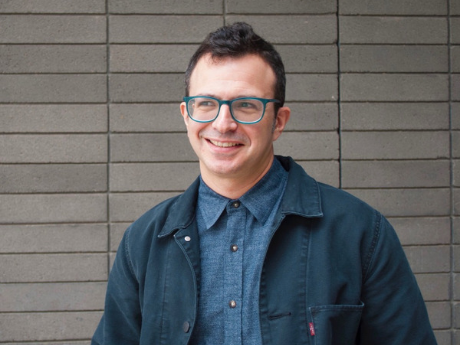In Their Own Words
Daniel Borzutzky on “Lake Michigan Merges Into The Bay of Valparaiso, Chile”

Lake Michigan Merges into the Bay of Valparaiso, Chile
the reasons for which our blood is drawn in the prison camps of Lake Michigan are not communicated to us
the reasons for which we are imprisoned are also not communicated to us
it is often said on the shores of Lake Michigan, which is the bay of Valparaiso, that we will die for reasons we do not understand
we do not understand why we do not understand why we will die
we do not understand why we do not understand why we are imprisoned
we do not understand why we do not understand why we are paid or beaten or loved
we do not understand why last night the authoritative bodies loaded up four ships worth of prisoners and why those boats are half a mile away from the beach, booming dance music, baking in the summer sun
we do not understand why the authoritative bodies don't sweep the carcasses of the dead pets and washed up animals off the beaches on which we walk and sleep
we do not understand our relationship one body to another
at times the authoritative bodies tell us to touch each other
at times they tell us to feed each other
at times they tell us to beat each other
at times they tell us to pay each other
at times they tell us to protect each other
at times they tell us to kiss each other
at times they tell us to probe each other with forceps, needles, and wooden skewers
at times they force us to force each other to drink dirty purple milk and to eat rotten bread and vegetables
at times they tell us to stick juicy oranges into each other's mouths
at times they tell us to kick each other and call each other offensive names
at times they tell us to chew and swallow everything
at times they tell us to curse and laugh and hiss
at times they say: pretend you are an immigrant and hiss for us
at times they say: pretend you are not an immigrant and speak as if you are not a communist
or they say: your faces are organs of emotional communication: smile or frown or cry
or they say: pretend you are a machine and that you do not have a soul
or they say: you are nothing more than a piece of data to be aggregated, to be disaggregated, to be sliced and diced into the most minute units so that we can understand how the body and the city and the nation whir and wallow and tick
or they say: you are a human machine and you must explode
there is good money, they say, in emotional responsiveness
and at times they pay us when we laugh or snarl or cry
or they say: there is nothing to be gained from emotional responsiveness
so they beat us when we laugh or snarl or cry
and they say: you have shame in your eyeballs, you have love in your eyeballs, you have pain in your dimples, you have guilt in your mouth, abjection in your lips, joy in your nostrils, anger in your cheekbones, love in the bags under your eyes, passion in your eyebrows, fear in your chin, disgust in your forehead, disaster and promise and despair in the furrows of your face and in the murmuring economies on your rotten carcass tongue
The poem appears in Daniel Borzutzky's The Performance of Becoming Human published by Brooklyn Arts Press in 2016. Used with permission of the author and publisher.
On "Lake Michigan Merges Into The Bay of Valparaiso, Chile"
"We are beings made for death…because the reasons each of us will die are always expressed in the most distant of languages, in an untranslatable language." These words were stated by Raúl Zurita in a talk he gave as part of a panel presentation with Anna Deeny, Valerie Mejer Caso and myself at the AWP in Boston 2013 (our talks were later published in Mandorla: New Writings of the Americas). The panel was about translation and distance, and Zurita offered these words to explain Garcilaso de la Vega's accounting of the decapitation of Tupac Amaru, the last of the Inca monarchs. It's Cusco, 1572. The herald is announcing the supposed offenses that have condemned Tupac Amaru (not named as such by Garcilosa) to death. The prisoner hears but does not understand. He asks the friar who is walking with him to translate because he does not know the language that contains the reasons for which he will die.
On February 24, 2015, Spencer Ackerman of The Guardian published an investigate article entitled: "The Disappeared: Chicago police detain Americans at abuse-laden 'black site'." The article tells the story of Homan Square, a secret interrogation facility on the west side of Chicago that operated between 2004-2015, a police torture-chamber, where detainees were not logged, were beaten by police, "shackled for prolonged periods," denied access to attorneys. Of the 7,000 people detained at Homan Square, writes Ackerman, 6,000 of them were black.
I live in Chicago, and my family is from Chile. I've written before of the ways in which Chicago is a Chilean city: a city that has copied Chile's extreme approach to privatization of public services as well as the Pinochet dictatorship's approach to policing and torturing its own citizens. And I am currently writing a book of poem/narratives called Lake Michigan that is about a prison-camp/torture zone on a beach on the northern end of Chicago, on the border with the city of Evanston. The bay of the Chilean city of Valparaiso is where the Chilean Naval Academy is located, and after Pinochet came to power it was a site of mass detention, torture and death.
In this poem the beaches of Lake Michigan and the Bay of Valparaiso (both beautiful in very different ways) merge together in my imagination. Here the broken bodies on the beaches of Lake Michigan, the beaten bodies, the privatized bodies, the immigrant bodies, the starving bodies, do not understand why they are detained, tortured, arbitrarily abused or commanded to abuse one another. They 'do not understand why they are paid or beaten or loved.'



